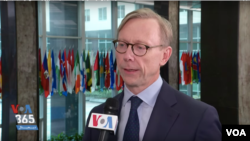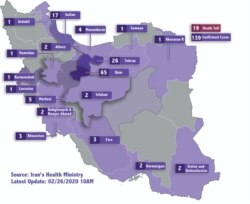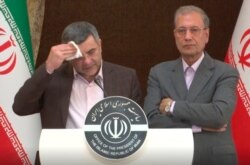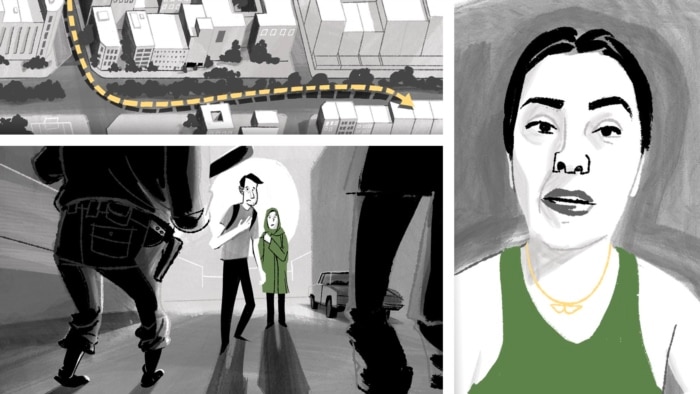The United States has sharpened its criticism of Iran’s handling of a deadly coronavirus outbreak, accusing authorities of covering up the extent of infections that have prompted a rare suspension of some Friday prayers in the Islamic republic.
In a Wednesday interview with VOA Persian at the State Department, U.S. Special Representative for Iran Brian Hook accused Iran of lying and having “suppressed important information” about the outbreak of the virus that causes the disease COVID-19.
Earlier, the Iranian government said its confirmed death toll from the virus rose to 19 from 15 on Tuesday, while reporting that confirmed cases more than doubled to 139 from 61 a day earlier. Iran had the second highest number of fatalities from the virus after China, where the outbreak first emerged in December.
“We know the (Iranian) statistics are much worse than the regime is telling its own people,” Hook said, without elaborating. “We wish the regime would prioritize the welfare of its own people over its revolutionary adventures.”
Hook’s comments reflected a toughening of the Trump administration’s rhetoric from the previous day, when Secretary of State Mike Pompeo told a press briefing that the U.S. was “deeply concerned by information indicating the Iranian regime may have suppressed vital details about the outbreak in that country.”
Some Iranians, suspicious of their government after it admitted to falsely denying responsibility for the accidental downing of a Ukrainian passenger jet last month, have used social media to make similar accusations of authorities trying to underreport or cover up the spread of the virus.
Iranian officials have denied the charge. In comments reported Wednesday by state TV, President Hassan Rouhani accused the U.S., a longtime enemy, of trying to spread fear among Iranians.
A credibility crisis
In his interview, Hook said Tehran is facing a credibility crisis in its handling of the virus and the downing of the passenger plane and its staging of a parliamentary election last Friday that drew the lowest turnout in four decades.
“This stuff tends to cascade and the regime should be concerned, because it has lost the support of its own people,” he said.
Hook also shared some new details about the Trump administration’s efforts to support the Iranian people during the health crisis. While referencing his January 30 announcement that a U.S. company had made the first sale and delivery of medicine to Iran through a Swiss humanitarian trade arrangement, Hook said, “We have another company that is ready to go.”
“We're hoping to have another announcement (about that company) in the next week or so,” Hook added, without providing further information.
Iran reported its first cases and deaths from the virus Feb. 19.
In the latest sign of the outbreak taking a growing toll on daily life in the country, Iranian Health Minister Saeed Namaki, speaking to state media Wednesday, said there will be a highly unusual suspension of Friday prayers this week in cities with confirmed cases. He also said access to Shiite shrines and other holy sites outside of Friday prayers will be restricted to those visitors who agree to use hand sanitizers and hand-washing liquids and who avoid gathering in groups as they pray.
Iranian authorities also have ordered schools and universities in virus-hit areas to stay closed in order to reduce the risk of contagion.
This article originated in VOA’s Persian Service.



